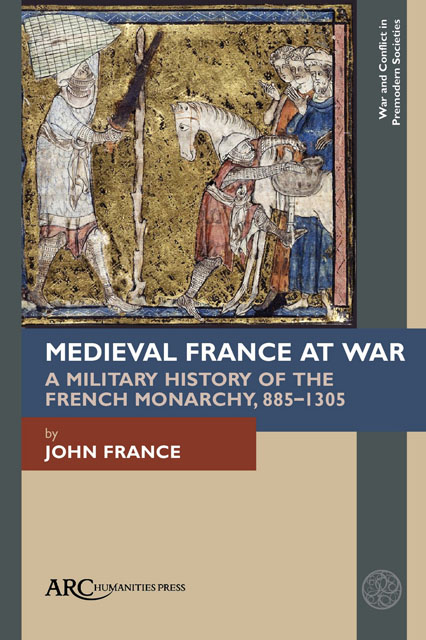Book contents
- Frontmatter
- Contents
- List of Illustrations
- Preface
- Introduction
- Chapter 1 Technology and Warfare
- Chapter 2 The Emergence Of France
- Chapter 3 French Monarchical Power in Context
- Chapter 4 Warfare In France To 1066
- Chapter 5 A Clash Of Dynasties 1066– 1180
- Chapter 6 Philip Ii and The Rise of France
- Chapter 7 The Expansion of France
- Chapter 8 Louis Ix and The Apogee Of French Power
- Chapter 9 The Problems Of Power
- Chapter 10 Perspectives on The Army of The Kings of France
- Bibliography
- Appendix: A Note on Sources
- Index
Chapter 3 - French Monarchical Power in Context
Published online by Cambridge University Press: 06 April 2023
- Frontmatter
- Contents
- List of Illustrations
- Preface
- Introduction
- Chapter 1 Technology and Warfare
- Chapter 2 The Emergence Of France
- Chapter 3 French Monarchical Power in Context
- Chapter 4 Warfare In France To 1066
- Chapter 5 A Clash Of Dynasties 1066– 1180
- Chapter 6 Philip Ii and The Rise of France
- Chapter 7 The Expansion of France
- Chapter 8 Louis Ix and The Apogee Of French Power
- Chapter 9 The Problems Of Power
- Chapter 10 Perspectives on The Army of The Kings of France
- Bibliography
- Appendix: A Note on Sources
- Index
Summary
THE KINGDOM OF France was never a coherent territorial entity, what we would call a state, but, rather, a collection of lands, rights, and claims. Additionally, as the word “claims” implies, these were often contested. The ways in which they were advanced, realized, fought over, and lost are related to the nature of French society, however, as are the armies that were a vital element in the monarchy’s development.
Since the collapse of Rome monarchs had been, essentially, the rulers of the rich and powerful who controlled the day to day life of ordinary people. The power of emperors and kings rested on their ability to build up resources, to manipulate the great through patronage, and to overawe or even threaten them with military power. The wealth of the king and his control of government gave him the means to reward. Royal offices were highly prized: to be a count was prestigious and well rewarded, and also enabled its holder to exercise power in his own interests. Kings could give their own land, and sometimes that of the Church, to favoured servants. The king could also, of course, act as a judge in disputes between the great and be the guarantor of the legitimacy of those who held power. This process left powerful lords with virtual autonomy, however, especially in the counties they controlled. Even a monarch as powerful as Charlemagne inveighed angrily against those who misused the royal power to repress lesser men in his Memorandum on Military Matters of 811. These great men drew their wealth from landed estates on which they subjugated the peasantry to the status of serfs, a process very apparent in Carolingian times and even earlier. Kings were expected to lead in war, though a wise ruler would consult so as to ensure that the great men would follow him. Successful war gained loot and gave the king’s aristocratic followers employment for their armed retinues. Monarchy had great patronage, which could be used to manipulate others. Personality mattered a great deal, though, for power was exercised in a relatively small circle of individuals and radiated out from the royal court through the spheres of influence (mouvances) of each.
- Type
- Chapter
- Information
- Medieval France at WarA Military History of the French Monarchy, 885-1305, pp. 35 - 48Publisher: Amsterdam University PressPrint publication year: 2022

